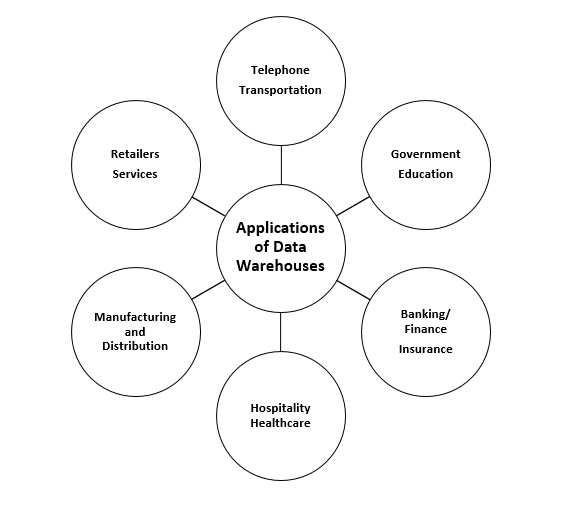12 Applications of Data Warehouse: Data Warehouses owing to their potential have deep-rooted applications in every industry which use historical data for prediction, statistical analysis, and decision making. Listed below are the applications of Data warehouses across innumerable industry backgrounds. In this article, we are going to discuss various applications of data warehouse.

12 Applications of Data Warehouse
So here are the various applications of Data Warehouse.
Also See: Data Warehouse Architecture
Banking Industry
In the banking industry, concentration is given to risk management and policy reversal as well analyzing consumer data, market trends, government regulations and reports, and more importantly financial decision making.
Most banks also use warehouses to manage the resources available on deck in an effective manner. Certain banking sectors utilize them for market research, performance analysis of each product, interchange and exchange rates, and to develop marketing programs.
Analysis of card holder’s transactions, spending patterns and merchant classification, all of which provide the bank with an opportunity to introduce special offers and lucrative deals based on cardholder activity. Apart from all these, there is also scope for co-branding.
Finance Industry
Similar to the applications seen in banking, mainly revolve around evaluation and trends of customer expenses which aids in maximizing the profits earned by their clients.
Consumer Goods Industry
They are used for prediction of consumer trends, inventory management, market and advertising research. In-depth analysis of sales and production is also carried out. Apart from these, information is exchanged business partners and clientele.
Also See: 9 Disadvantages and Limitations of Data Warehouse
Government and Education
The federal government utilizes the warehouses for research in compliance, whereas the state government uses it for services related to human resources like recruitment, and accounting like payroll management.
The government uses data warehouses to maintain and analyze tax records, health policy records and their respective providers, and also their entire criminal law database is connected to the state’s data warehouse. Criminal activity is predicted from the patterns and trends, results of the analysis of historical data associated with past criminals.
Universities use warehouses for extracting of information used for the proposal of research grants, understanding their student demographics, and human resource management. The entire financial department of most universities depends on data warehouses, inclusive of the Financial Aid department.
Healthcare
One of the most important sector which utilizes data warehouses is the Healthcare sector. All of their financial, clinical, and employee records are fed to warehouses as it helps them to strategize and predict outcomes, track and analyze their service feedback, generate patient reports, share data with tie-in insurance companies, medical aid services, etc.
Hospitality Industry
A major proportion of this industry is dominated by hotel and restaurant services, car rental services, and holiday home services. They utilize warehouse services to design and evaluate their advertising and promotion campaigns where they target customers based on their feedback and travel patterns.
Insurance
As the saying goes in the insurance services sector, “Insurance can never be bought, it can be only be sold”, the warehouses are primarily used to analyze data patterns and customer trends, apart from maintaining records of already existing participants. The design of tailor-made customer offers and promotions is also possible through warehouses.
Manufacturing and Distribution Industry
This industry is one of the most important sources of income for any state. A manufacturing organization has to take several make-or-buy decisions which can influence the future of the sector, which is why they utilize high-end OLAP tools as a part of data warehouses to predict market changes, analyze current business trends, detect warning conditions, view marketing developments, and ultimately take better decisions.
They also use them for product shipment records, records of product portfolios, identify profitable product lines, analyze previous data and customer feedback to evaluate the weaker product lines and eliminate them.
For the distributions, the supply chain management of products operates through data warehouses.
The Retailers
Retailers serve as middlemen between producers and consumers. It is important for them to maintain records of both the parties to ensure their existence in the market.
They use warehouses to track items, their advertising promotions, and the consumers buying trends. They also analyze sales to determine fast selling and slow selling product lines and determine their shelf space through a process of elimination.
Services Sector
Data warehouses find themselves to be of use in the service sector for maintenance of financial records, revenue patterns, customer profiling, resource management, and human resources.
Telephone Industry
The telephone industry operates over both offline and online data burdening them with a lot of historical data which has to be consolidated and integrated.
Apart from those operations, analysis of fixed assets, analysis of customer’s calling patterns for sales representatives to push advertising campaigns, and tracking of customer queries, all require the facilities of a data warehouse.
Transportation Industry
In the transportation industry, data warehouses record customer data enabling traders to experiment with target marketing where the marketing campaigns are designed by keeping customer requirements in mind.
The internal environment of the industry uses them to analyze customer feedback, performance, manage crews on board as well as analyze customer financial reports for pricing strategies.
So all these are the applications of Data Warehouse.
Thanks for help, this content very much helpful for my exam and also your language is easy so anyone can understand.
Once again Thank you.
Well explained topic. This article simplified everything i needed to know about Data Warehousing. Thank you
Very useful information, in detail. Will like to read other topics also!